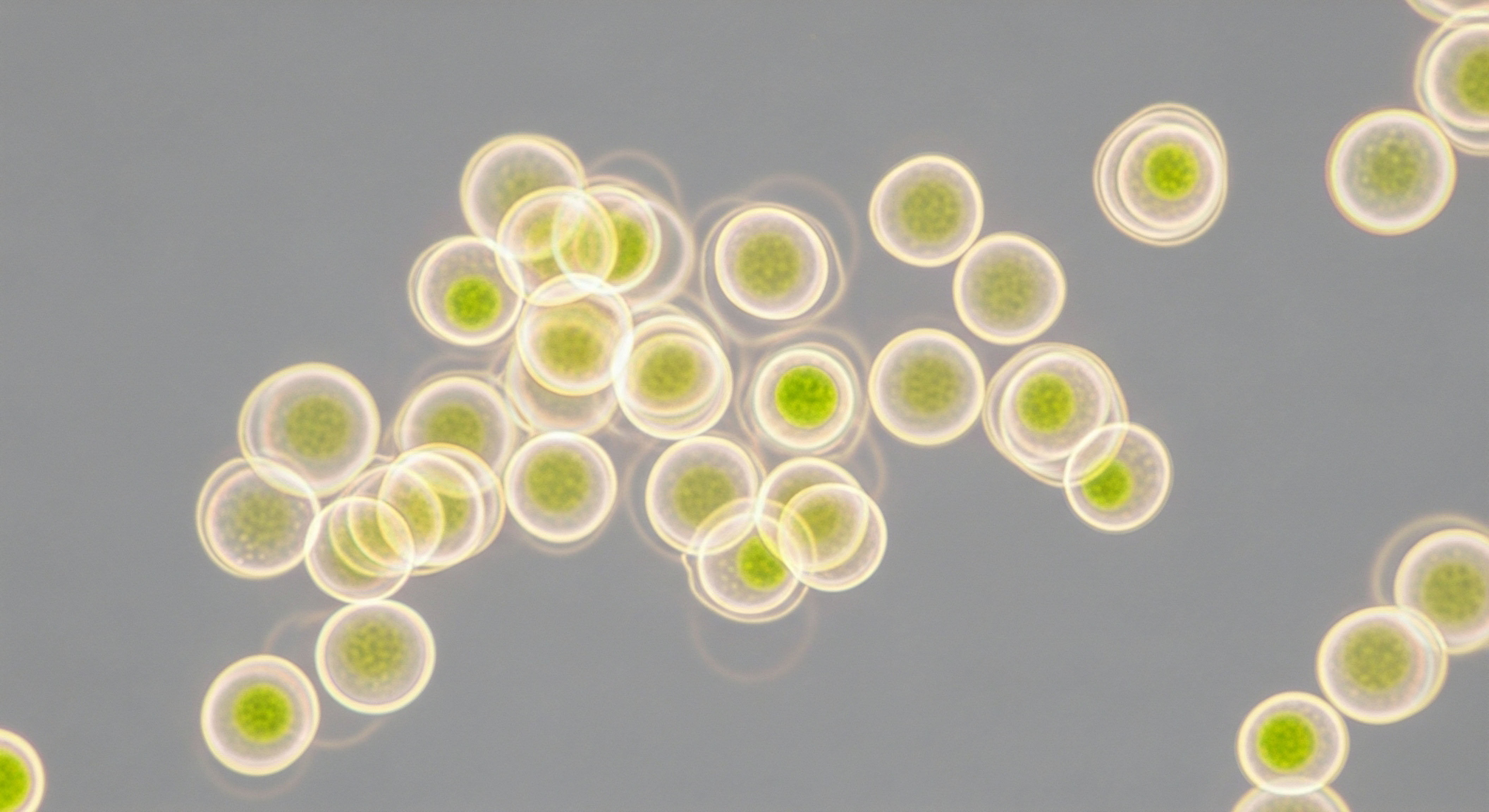

Fundamentals
Many individuals find themselves contemplating the subtle shifts in their vitality, the unexpected changes in their metabolic rhythm, or the pervasive sense that their biological systems are operating below their potential. You might experience persistent fatigue, shifts in body composition, or an altered mood, often wondering if these manifestations are simply an unavoidable consequence of time or predetermined genetic fate.
This perspective frequently fosters a feeling of powerlessness over one’s own health trajectory. However, a deeper understanding of human biology reveals a profound layer of personal agency, a dynamic interplay between your daily choices and your very genetic expression. Your individual journey toward optimal health is deeply intertwined with these biological mechanisms, offering a pathway to reclaim robust function and sustained well-being.
The field of epigenetics offers a powerful lens through which to view this personal biological narrative. Genes, the fundamental units of heredity, provide the blueprint for your physiology. Epigenetic marks function as a sophisticated operating system for this blueprint, dictating when and how genes are activated or silenced.
These chemical annotations sit atop the DNA sequence, influencing its readability without altering the underlying code itself. Consider these marks as switches or dimmers on your genetic expression, responding directly to environmental cues and lifestyle inputs. Your dietary patterns, physical activity levels, stress responses, and even your sleep architecture continuously send signals that can recalibrate these epigenetic switches.
This dynamic responsiveness means your biology is in constant dialogue with your environment, translating lived experiences into molecular instructions that shape your health in real time.
Epigenetic marks are dynamic regulators of gene expression, responding to lifestyle choices and environmental signals without altering the fundamental DNA sequence.

How Daily Choices Shape Gene Expression
The connection between your daily habits and your genetic function is remarkably direct. For instance, the nutrients consumed through your diet provide the essential building blocks for many epigenetic modifications. Specific vitamins and cofactors, such as B vitamins like folate, are crucial for the biochemical reactions that add methyl groups to DNA, a key epigenetic mark.
A nutrient-dense diet, therefore, directly supports the body’s capacity for precise gene regulation. Conversely, chronic exposure to inflammatory agents or a consistent intake of highly processed foods can disrupt these delicate processes, leading to aberrant epigenetic patterns. These patterns often correlate with metabolic dysfunction and systemic inflammation, impacting your current state of health. The choices made today actively sculpt the molecular landscape of your cells.
Physical activity represents another potent epigenetic modulator. Regular movement influences the expression of genes involved in energy metabolism, insulin sensitivity, and mitochondrial biogenesis. Sedentary lifestyles, in contrast, can lead to epigenetic changes that promote insulin resistance and fat accumulation. The body’s response to exercise is a testament to its adaptive capacity, with epigenetic adjustments facilitating improved physiological performance.
Stress, too, leaves an indelible epigenetic signature. Chronic psychological stress activates the hypothalamic-pituitary-adrenal (HPA) axis, leading to sustained elevation of stress hormones. These hormones, in turn, can induce epigenetic modifications in brain regions associated with mood regulation and stress resilience, impacting emotional well-being and cognitive function. Understanding these connections empowers you to view your health as an ongoing, responsive system, where every choice contributes to your unique biological expression.


Intermediate
For those familiar with the foundational concepts of epigenetics, the next logical inquiry involves the specific mechanisms through which lifestyle choices modulate these gene-regulatory marks and, more compellingly, whether these changes can extend their influence beyond an individual’s lifespan.
The interconnectedness of the endocrine system, a sophisticated network of glands and hormones, plays a central role in translating environmental signals into epigenetic modifications. Hormones function as critical messengers, orchestrating a vast array of physiological processes, from metabolism and growth to mood and reproduction. Their balance or dysregulation, often a direct consequence of lifestyle, profoundly impacts the epigenetic landscape of various tissues, including the germline cells that carry biological information to subsequent generations.

Endocrine Signaling and Epigenetic Remodeling
The endocrine system acts as a primary conduit for environmental information to reach the genome. Consider the impact of metabolic health on this intricate dance. Sustained states of hyperglycemia or insulin resistance, frequently linked to dietary patterns and physical inactivity, induce systemic inflammation and oxidative stress.
These biochemical stressors can trigger epigenetic changes in genes associated with glucose metabolism and lipid handling. For example, pancreatic beta cells, responsible for insulin production, can undergo epigenetic reprogramming under chronic metabolic strain, affecting their function.
The adipose tissue, once viewed simply as a storage depot, is now recognized as an active endocrine organ, releasing adipokines that influence systemic metabolism and, by extension, the epigenetic state of other tissues. Maintaining optimal metabolic function through targeted nutritional strategies and regular physical activity, therefore, becomes a powerful means of stabilizing a healthy epigenetic profile.
Clinical protocols aimed at optimizing hormonal balance offer a compelling example of intervening in these epigenetic pathways. For men experiencing symptoms of hypogonadism, testosterone replacement therapy (TRT) protocols involve careful administration of exogenous testosterone, often alongside agents like Gonadorelin to support endogenous production and Anastrozole to manage estrogen conversion.
These interventions aim to restore physiological testosterone levels, which are critical for muscle mass, bone density, libido, and cognitive function. At a molecular level, optimal androgen signaling can influence gene expression through various mechanisms, including direct binding of androgen receptors to DNA regulatory elements and indirect modulation of epigenetic enzymes.
Similarly, for women navigating peri-menopause or post-menopause, carefully calibrated hormonal optimization protocols involving testosterone and progesterone can alleviate symptoms and restore physiological equilibrium. These exogenous hormonal signals, when precisely administered, can help recalibrate cellular environments, potentially influencing epigenetic marks in a beneficial direction, thereby supporting overall cellular function and tissue health.
Hormonal optimization protocols, such as targeted testosterone and progesterone therapies, can indirectly influence epigenetic modifications by restoring physiological equilibrium within cellular environments.

Lifestyle’s Epigenetic Legacy across Generations
The question of intergenerational epigenetic inheritance compels a closer look at the germline ∞ the sperm and egg cells. For epigenetic changes to be truly heritable across generations, they must be established in these germ cells and survive the complex reprogramming events that occur during early embryonic development.
Research indicates that parental lifestyle choices, even prior to conception, can leave epigenetic imprints in the germline. A father’s diet, for instance, has been shown to influence the epigenetic profile of his sperm, affecting the metabolic health of his offspring.
Similarly, a mother’s nutritional status and stress levels during gestation can epigenetically program the developing fetus, shaping its susceptibility to various conditions later in life. This phenomenon highlights a profound responsibility inherent in personal health decisions, extending their potential impact far beyond the individual.
Consider the table below, illustrating how various lifestyle factors can induce epigenetic modifications and their potential impact on future generations:
| Lifestyle Factor | Epigenetic Mechanism Influenced | Potential Intergenerational Impact |
|---|---|---|
| Nutrition (e.g. folate, B vitamins) | DNA Methylation, Histone Modification | Metabolic health, disease susceptibility |
| Chronic Stress | Histone Modification, microRNA expression | Stress resilience, neurodevelopment |
| Physical Activity | DNA Methylation, Histone Modification | Metabolic efficiency, cardiovascular health |
| Environmental Toxins | DNA Methylation, Histone Modification | Endocrine disruption, developmental disorders |
The administration of growth hormone peptides, such as Sermorelin or Ipamorelin, also represents a clinical strategy that indirectly affects cellular signaling pathways, which in turn can influence epigenetic regulators. These peptides stimulate the body’s natural production of growth hormone, supporting tissue repair, lean muscle mass, and metabolic rate.
While their primary action is on protein synthesis and cellular regeneration, the resulting improvements in cellular health and metabolic efficiency create an environment more conducive to healthy epigenetic maintenance. Similarly, targeted peptides like PT-141 for sexual health or Pentadeca Arginate (PDA) for tissue repair act on specific physiological systems, thereby contributing to an optimized internal milieu that can indirectly support robust epigenetic function. These advanced protocols underscore the intricate relationship between targeted biochemical interventions and the broader epigenetic landscape.


Academic
The discourse surrounding the heritability of lifestyle-induced epigenetic changes requires a rigorous examination of molecular mechanisms and their propagation through the germline. While the concept of genetic inheritance has long been understood through Mendelian principles, the transmission of acquired characteristics via epigenetic means presents a more complex, yet equally compelling, narrative.
The endocrine system, with its pervasive influence on cellular physiology, emerges as a critical mediator in translating environmental signals into stable epigenetic marks that can potentially traverse generations. This section will delve into the molecular intricacies of transgenerational epigenetic inheritance, specifically focusing on how endocrine and metabolic dysregulation can establish these heritable modifications.

Molecular Mechanisms of Epigenetic Inheritance in Germ Cells
Epigenetic information is primarily encoded through three major molecular mechanisms ∞ DNA methylation, histone modifications, and non-coding RNAs (ncRNAs). DNA methylation involves the addition of a methyl group to cytosine bases, typically in CpG dinucleotides, leading to gene silencing when occurring in promoter regions.
Histone modifications encompass a variety of chemical tags, such as acetylation, methylation, and phosphorylation, on the histone proteins around which DNA is wrapped. These modifications alter chromatin structure, influencing gene accessibility and expression. Non-coding RNAs, particularly small RNAs like microRNAs (miRNAs) and piwi-interacting RNAs (piRNAs), can regulate gene expression by targeting messenger RNA (mRNA) for degradation or translational repression.
For these marks to be transmitted across generations, they must be established in the parental germ cells (sperm and oocytes) and then persist through the extensive epigenetic reprogramming events that occur during fertilization and early embryonic development.
These reprogramming phases, involving global demethylation and remethylation, represent significant barriers to transgenerational inheritance, making the persistence of specific epigenetic marks a subject of intense scientific scrutiny. Certain genomic regions, however, appear to be protected from complete erasure, facilitating the transmission of specific epigenetic information.
Endocrine disruptors and metabolic imbalances serve as powerful exogenous and endogenous signals capable of inducing these germline epigenetic modifications. Exposure to certain environmental chemicals, known as endocrine-disrupting chemicals (EDCs), can interfere with hormone synthesis, transport, and receptor binding. Such disruptions can lead to aberrant DNA methylation patterns in germ cells.
For instance, studies have shown that paternal exposure to vinclozolin, an antifungal agent, induces transgenerational epigenetic inheritance of male infertility and disease susceptibility in offspring, mediated by changes in sperm DNA methylation and ncRNA profiles. These findings underscore the profound impact of environmental endocrine modulators on germline epigenetics.
Similarly, parental metabolic health, particularly conditions such as obesity and type 2 diabetes, is increasingly linked to epigenetic changes in sperm and oocytes. High-fat diets in fathers, for example, have been associated with altered sperm miRNA profiles, contributing to metabolic dysregulation in subsequent generations. The precise mechanisms involve the direct influence of circulating hormones and metabolites on the activity of epigenetic enzymes, such as DNA methyltransferases (DNMTs) and histone deacetylases (HDACs), within the germ cells themselves.
Parental metabolic health and exposure to endocrine disruptors can induce specific epigenetic changes in germ cells, influencing offspring’s health trajectories across generations.

Interplay of Biological Axes and Transgenerational Effects
The intricate interplay of various biological axes, such as the Hypothalamic-Pituitary-Gonadal (HPG) axis and the Hypothalamic-Pituitary-Adrenal (HPA) axis, critically influences the germline epigenetic landscape. Chronic activation of the HPA axis due to psychological stress leads to sustained glucocorticoid elevation.
These stress hormones can modulate gene expression in the gonads, potentially altering the epigenetic marks in developing sperm and oocytes. Research in animal models has demonstrated that paternal stress can induce anxiety-like behaviors and metabolic disturbances in offspring, often correlated with specific changes in sperm miRNA content.
The HPG axis, central to reproductive function, is similarly susceptible to epigenetic regulation. Dysregulation of gonadotropin-releasing hormone (GnRH) pulsatility or sex hormone levels can lead to altered epigenetic states in reproductive tissues, potentially impacting germ cell quality and the epigenetic information they carry. The integration of these systemic hormonal signals into the germline’s epigenetic machinery represents a sophisticated mechanism through which parental experiences can be biologically encoded for transmission.
The clinical implications of transgenerational epigenetic inheritance are substantial, informing a more holistic approach to preconception health. Understanding that parental metabolic health and endocrine balance prior to conception can influence the epigenetic programming of offspring provides a powerful rationale for optimizing wellness in both prospective parents.
This includes not only addressing overt hormonal deficiencies through targeted endocrine system support, such as carefully managed testosterone optimization protocols for men or female hormone balance strategies for women, but also considering broader lifestyle interventions. Nutritional interventions aimed at supporting methylation pathways, stress reduction techniques to modulate the HPA axis, and regular physical activity to enhance metabolic function all contribute to a more favorable germline epigenetic environment. The table below outlines key epigenetic mechanisms and their relevance to intergenerational health:
| Epigenetic Mechanism | Description | Relevance to Intergenerational Health |
|---|---|---|
| DNA Methylation | Addition of methyl groups to cytosine bases, typically silencing genes. | Parental diet and stress can alter sperm/oocyte methylation, affecting offspring metabolic risk. |
| Histone Modification | Chemical changes to histone proteins, altering chromatin structure and gene accessibility. | Environmental exposures can induce heritable histone marks, influencing offspring neurodevelopment. |
| Non-coding RNAs | Small RNA molecules regulating gene expression (e.g. miRNAs, piRNAs). | Sperm and oocyte ncRNA profiles, influenced by parental lifestyle, can reprogram embryonic development. |
The pursuit of robust health, therefore, extends beyond personal well-being, encompassing a profound intergenerational dimension. The emerging evidence suggests that a commitment to endocrine health, metabolic function, and personalized wellness protocols holds implications for the vitality and functional capacity of future generations. This scientific understanding compels a deeper appreciation for the interconnectedness of human biology and the enduring impact of individual choices.

Can Early Life Exposures Program Future Generations?
Early life exposures represent a particularly sensitive window for epigenetic programming with long-term consequences. Maternal nutrition during pregnancy, for instance, has a well-documented impact on the offspring’s metabolic phenotype, a phenomenon often explained by developmental plasticity and epigenetic modifications. The concept extends further when considering the germline.
Epigenetic marks established in a fetus’s germ cells during its own development, influenced by the maternal environment, can theoretically be passed down to that individual’s children, creating a three-generational effect. This “fetal programming” hypothesis, now expanded to include epigenetic mechanisms, highlights how the intrauterine environment can shape the health trajectories of descendants. The careful management of maternal health, including addressing any hormonal imbalances or metabolic dysregulation, thus assumes an even greater significance for the health of future lineage.

References
- Dolinoy, Dana C. “The agouti mouse model ∞ an epigenetic biosensor for nutritional and environmental alterations on the epigenome.” Nutrition Reviews, vol. 68, no. Suppl 1, 2010, pp. S7-S10.
- Jirtle, Randy L. and Frederick L. Tyson. “Environmental epigenomics and disease susceptibility.” Environmental Health Perspectives, vol. 114, no. 10, 2006, pp. 1472-1478.
- Skinner, Michael K. et al. “Environmentally induced epigenetic transgenerational inheritance of disease.” Environmental Health Perspectives, vol. 116, no. 12, 2008, pp. 1593-1602.
- Lim, Aaron, and Emma Whitelaw. “The epigenetics of obesity ∞ an update.” Current Opinion in Clinical Nutrition and Metabolic Care, vol. 18, no. 4, 2015, pp. 326-332.
- Anway, Matthew D. et al. “Epigenetic transgenerational actions of endocrine disruptors and male fertility.” Science, vol. 308, no. 5727, 2005, pp. 1466-1469.
- Holliday, Robin. “Epigenetics ∞ a historical overview.” Epigenetics, vol. 1, no. 2, 2006, pp. 76-80.
- Morgan, David K. et al. “DNA methylation and its role in disease.” Clinical Genetics, vol. 72, no. 3, 2007, pp. 177-188.
- Heard, Edith, and Robert A. Martienssen. “Transgenerational epigenetic inheritance in plants and animals.” Science, vol. 342, no. 6156, 2014, pp. 1237583.
- Gapp, Katharina, et al. “Implication of sperm RNAs in transgenerational inheritance of the effects of early trauma in mice.” Nature Neuroscience, vol. 17, no. 5, 2014, pp. 667-669.
- Jensen, Per. “The epigenetics of behavior ∞ beyond DNA sequence.” Trends in Genetics, vol. 28, no. 11, 2012, pp. 531-537.

Reflection
Having traversed the intricate landscape of epigenetics and its profound intergenerational implications, you now possess a deeper understanding of your own biological agency. This knowledge is not merely academic; it serves as a powerful invitation to introspection regarding your personal health journey.
The choices you make regarding your hormonal health, metabolic function, and overall well-being resonate beyond your immediate experience, potentially shaping the biological foundations for those who follow. Consider this exploration a vital first step, a foundational insight into the dynamic systems governing your vitality.
Reclaiming robust function and sustained well-being often requires a personalized path, guided by a precise understanding of your unique biological blueprint and the subtle, yet powerful, influences of your environment. Your proactive engagement with these principles becomes a testament to a profound commitment to health, extending its reach far into the future.



